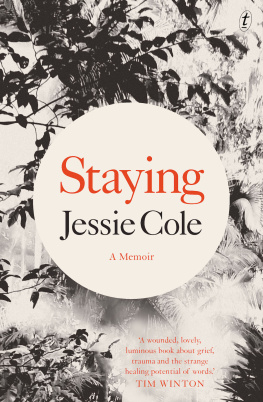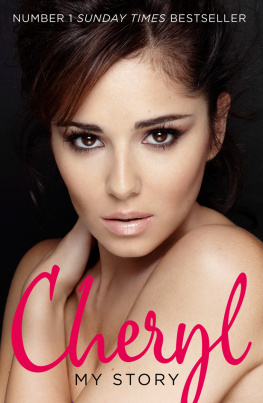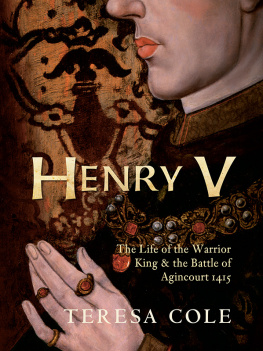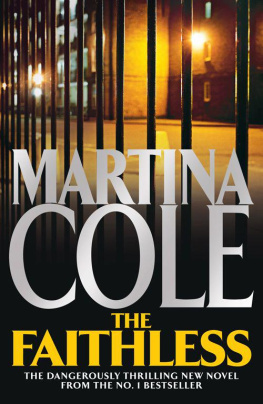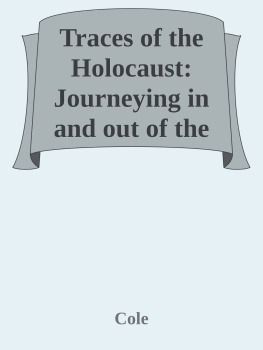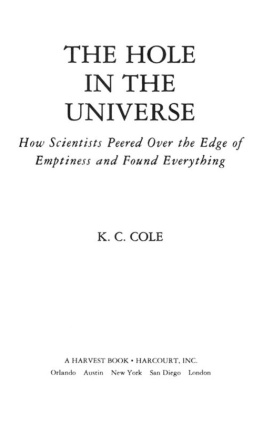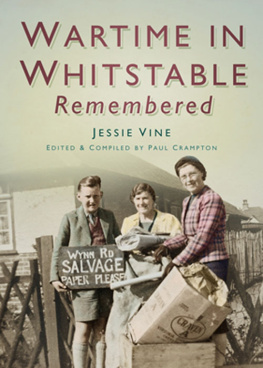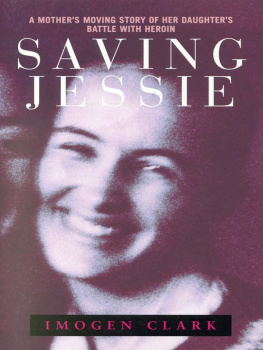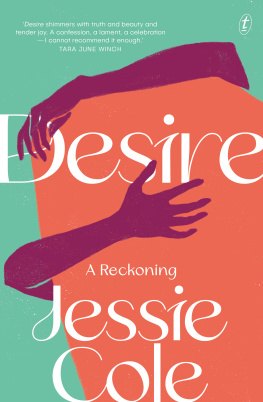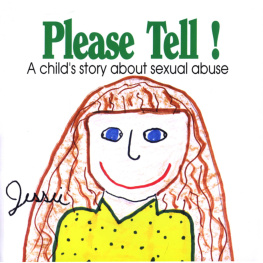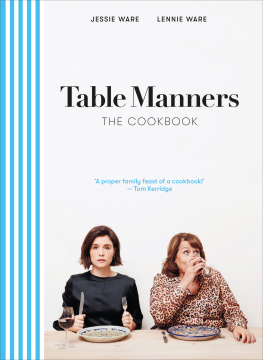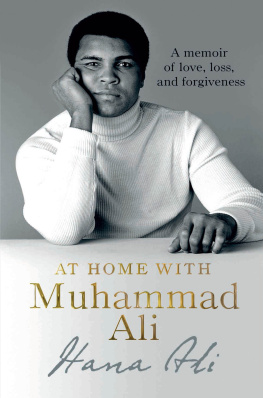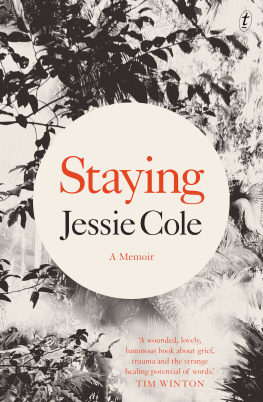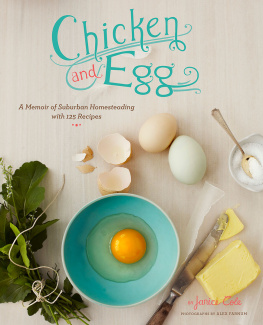As children, Jessie Cole and her brother Jake ran wild, free to roam their rainforest home as they pleased. They had each other, parents who adored them, and two mysterious, beautiful, clever half-sisters, Billie and Zoe, who came to visit every holidays. But when Jessie was on the cusp of adolescence, tragedy struck, and her happy, loving family fell apart.
This heartbreaking memoir asks what happens to those who are left behind when someone takes their own life. Its about the importance of home, family and forgivenessand finding peace in a place of pain.
By the critically acclaimed author of Darkness on the Edge of Town and Deeper Water.
Staying aches and pulses with lifeCole is a writer. Anna Krien
For all those left behind
Contents

The car hums. It is parked in the garage. The forest ticks around itthe cracking of branches, the buzz of crickets, the light swish of leaves as they fall down from the trees. The spiders scuttle about repairing their webs. A possum shrieks off in the distance. The stray ginger cat haunts the periphery.
But inside the car my father is breathless.
In a few hours my mother will find him. He wont answer his phone and she will know, and she will drive out from the yellow beach shack to check. She will find him, dead, and go inside and call the ambulance and our friends from down the road. Then she will wait with my father, listening to the sounds of the forest. Our friends will arrive first, because they arent far away, and they will clean the blood from the bathroom, from where my father tried to slit his wrists, so my mother doesnt have to. The police and ambulance will come, and they will take his body away. Later, we will receive an ambulance bill, addressed to my father, though he was dead when the paramedics arrived and they could not revive him. His name on that envelope will hit us like a punch to the solar plexus.
But lets go back. To the humming car in the garage. To my fathers last thoughts.
He is lying across the back seat, his eyes closed, blocking out the world. The pressure of his tortured grief is slowly lessening in his chest. There is the faintest hint of relief. But he knows that he has failed us, and that must weigh upon him too. Scratched out beside him lies a note.
Billie, Jessie, JakeyIm sorry. JannyI love you.
And it is all there, in those words. The life we had and the life we lost.
Since my fathers suicide, the word trust has gotten under my skin. If someone should utter it as a way to soothe me, I will go someplace quiet and cry. The very word has become broken. I hear in it only the echoes of its opposite. Hints of leavings, endings, goodbyes. Whispers of risk, hurt, harm. But it was not this way from the outset. I was born four weeks earlya premmie babydelicate and clingy like a nursling possum. My mother tells me I barely slept. She says that in the middle of the night my father brought me up onto his chest, his strong heartbeat banging there beneath my tiny ear. And I would slip straight into sleep, because there was no safer place.
My earliest memories all involve the nourishment I found in my parents bodies. A feeling of being held, of skin settling against skin. I remember no tussles over privacy or space, more a surrender of their bodies to mine. You are welcome here, their touch seemed to say. Come, make yourself at home. I slept between them, rolling from one pair of arms to the next. They each had their own smell, distinct and animal. My father had a tiny thatch of hair in the middle of his chest, no more than twenty strands, and pressed up against him in the early mornings I petted it like a pelt. My mother let me play a game, a womb-game, though I didnt call it that. She curled up on her side and I snuggled into the triangle between her knees and chest. Cubbies, I murmured, lets play cubbies, and she never refused. My brother was born when I was twenty months old. My parents friends, who lived next door, came over to babysit me while my mother gave birth, and I woke in the night to their unfamiliar bodies. The woman whispered, Mummy will be home soon, Mummy will be home soon, and I could feel the anxiety seeping out around her. She seemed concerned I might not believe her, but there was nothing I was more certain of.
I was born in the late 1970s, whenin northern New South Wales at leasteverything was up for grabs. Right and wrong were social constructs, conventionality was spurned, conformity worth escaping and money-making pass. Polyamory was the new frontier. Drugs and alcohol, dreaming and philosophy. Anything could happen and probably did.
In among this jumble of living experiments, my parents decided to test the hypothesis that children were born purethat the less you interfered with their natural goodness, the less damage you did. They were not the first to propose such a radical theory. D. H. Lawrence once set out three rules of childcare: How to begin to educate a child. First rule, leave him alone. Second rule, leave him alone. Third rule, leave him alone. That is the whole beginning. My parents did little to actively socialise us. I can only assume they believed my brother, Jake, and I would learn by example. We watched my mothers brow carefully for signs of displeasure, and it was a fairly reliable indicator, but there were few rules and few explanations. We werent required to use words like please or thank you. Clothes were optional. We ate all our food with spoons. We didnt have a bedtime. Sometimes when we were rowdy or wild our father would yell, and wed stand by, quietly ashamed, but our mother would swoop down and say, Oh, theyre not naughtytheyre just tired. And we would smile, all our goodness restored.
We lived far outside of town, nestled in green hills, on a winding dead-end road in a tiny town called Burringbar. Filled with hopes for a new start, a tree-changeanother worldmy parents had packed up their busy Sydney lives for the freedom of the country. They had bought a few acres of pasture and set about planting out a magnificent garden. A forest. When I was little the trees were little too, saplings, and we all grew together, from nothing much to something. Maybe all children believe their parents create the world, but in my case it appeared to be true. In the first year my parents lived at Burringbar they oversaw the building of a house. It was experimental too, all its rooms separated by the quick-growing forest. Our home sprang up around me, as the garden had before it, my parents vision becoming quickly manifest.
Running down the centre was a long, open walkway paved with bricks. From the edges of the walkway the rooms spread like islands. The garden was the deep green sea, the bedrooms private cloistered worlds. The walkway led to a highset pavilion with a sloping wooden-shingled roof. Temple-like, it presided over the house. Palms and bromeliads grew thick between the rooms, and through the large sliding glass doors all that could be seen was a multitude of dense greens with an occasional stripe of colour, a bromeliad in flower. Walking through the doors into the garden there was no drop, no stepit was just a slow, indefinite drift outside.
Back then, the world seemed a welcoming place. The bushland surrounding us was full of creatures: lizards, birds, snakes, frogs, toads, ants, beetles, bees. We had a dog and two cats and a pet magpie, Georgie, who with a little coaxing would perch on my mothers arm. Once a giant goanna came out from the forest and plodded, dinosaur-like, down the open walkway. We stood to watch it, letting it pass. Eventually it scurried under a cushioned bench. Ill get it! I cried, clambering beneath the bench, hands outstretched. The goanna scratched me, bloody lines all up my arms. I screamed in outrage, my panicking mother wrenching me out by my feet. I was bewilderedwhy didnt it want to play?

